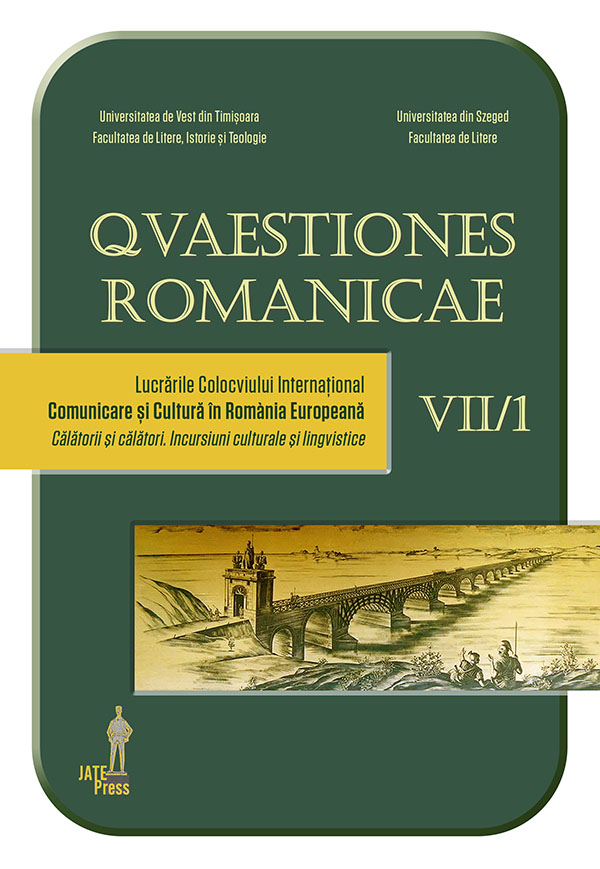Călătoria spirituală sau / și elementele „actului de credință” la monahul Nicolae Steinhardt
Abstract: (The spiritual journey and / or the elements of the “act of faith” to the monk Nicholas Steinhardt) In the Romanian cultural space, Nicholas Steinhardt’s name falls into the pantheon of those who have traced eminently spiritual travellers through the gesture of conversion into the space of Orthodoxy. Not only geographically he sought spiritual identity. (from the childhoods’ Pantelimon, in Bucharest studies, from the European cultural wanderings, to the Romanian monasteries) but also through the adventure of a life under the sign of the profound analysis of the meanings of the act of faith. This is not a derogatory one, a simple exercise of spirituality: it is strong and rigorously anchored in the eschatological plane and is about salvation. His outlook is innovative, he sees faith in five aspects (but not last, not defining!) that constitute a dynamism, an act: prayer, kindness, music, happiness, poetry. This exhibition of spiritual life persists in his texts, even if fragmentary, polarizing the discourse, interpreting the theological practitioner’s theologically and morally. Through the “act of faith” it is noticed the three manifestations of faith which sealed his conversion: the prebaptismal faith (natural, responsible for searching for a religious sense of life), the baptismal faith (of baptism itself, as a liturgical act) and the post-baptismal faith (which leads him to monasticism). N. Steinhardt does not make another mystical system through the “decalogue” of the act of faith, but anchors it biblically. The constant call to the cry “I believe, Lord, help my unbelief!” accentuates the continuity of spiritual development from baptism to the act of faith, effective through the existential paradox that includes the possibility of salvation.
Keywords: faith, prayer, kindness, poetry, happiness.
Rezumat: În spațiul cultural românesc, numele lui Nicolae Steinhardt se înscrie în panteonul celor care au trasat călătorii eminamente spirituale prin gestul convertirii în spațiul Ortodoxiei. Nu doar geografic a căutat identitatea spirituală (de la Pantelimonul copilăriei, la Bucureștiul studiilor, de la peregrinările culturaleuropene, la circuitul mânăstirilor românești), cât mai ales prin aventura unei vieți aflate sub semnul analizei profunde a semnificațiilor actului de credință. Acesta nu este unul derizoriu, un simplu exercițiu de spiritualitate: e puternic și riguros ancorat în planul eshatologic și vizează mântuirea. Perspectiva sa este novatoare, „credința” o „înveșmântează” în cinci aspecte (dar nu ultime, nu definitorii!) ce constituie prin excelență un dinamism, o făptuire, un act: rugăciunea, bunătatea, muzica, starea de fericire, poezia. Acest expozeu al vieții spirituale persistă în textele sale, chiar dacă fragmentar, polarizând discursul, interpretând teologic și moral actele practicantului religios. Prin „actul de credință” se decelează cele trei manifestări ale credinței care i-au pecetluit convertirea: credința prebaptismală (naturală, responsabilă de căutarea unui sens religios vieții), credința baptismală (a botezului în sine, ca act liturgic) și credința postbaptismală (care îl duce spre monahism). N. Steinhardt nu realizează un alt sistem mistic prin „decalogul” actului de credință, ci îl ancorează biblic. Apelul constant la strigătul „Cred, Doamne, ajută necredinței mele!” accentuează continuitatea devenirii spirituale de la botez la actul credinței, eficient prin paradoxul existențial care include și posibilitatea mântuirii.
Cuvinte-cheie: credință, rugăciune, bunătate, poezie, fericire.
